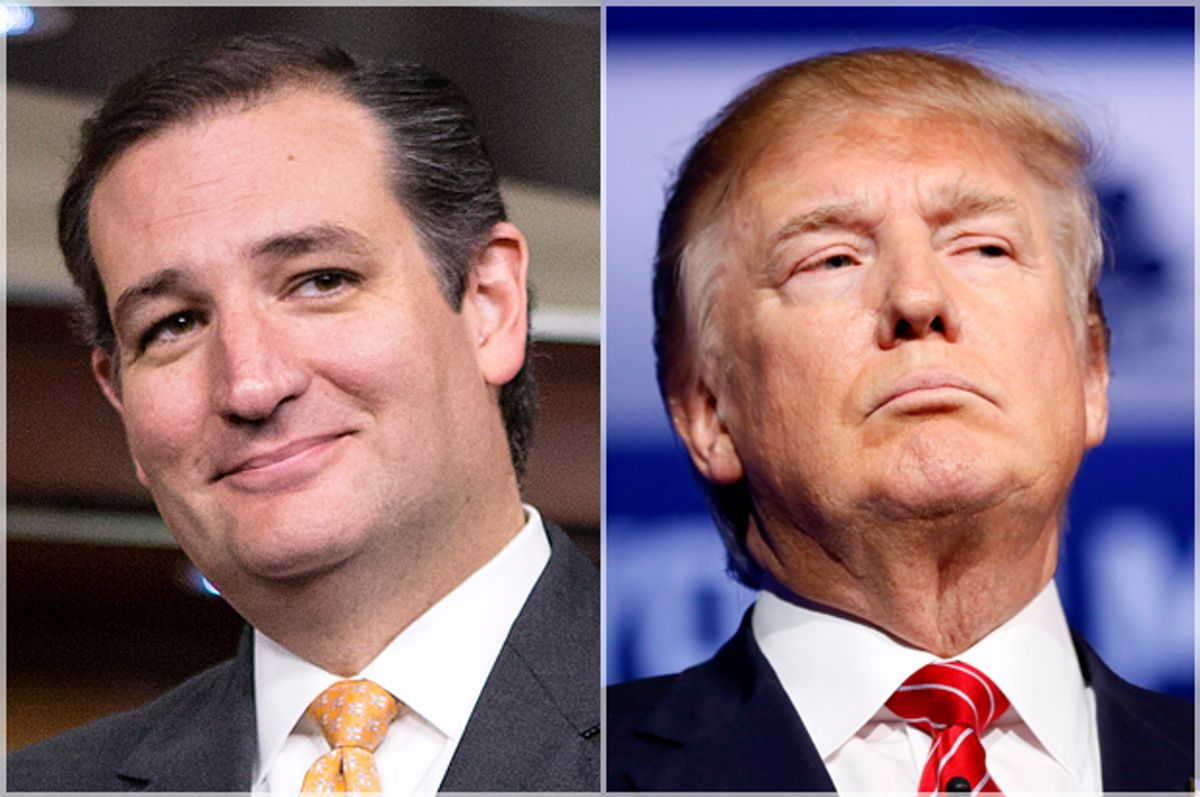The trend has been discernible for a while now, and the latest polling confirms it: A rising number of Republican caucus-goers are coming around to the idea of making Texas Sen. Ted Cruz the next U.S. president.
With just a few weeks left before the Iowa caucuses officially launch the 2016 campaign, the lead that Donald Trump’s held for the better part of six months is all but vanished. Trump’s star isn’t falling; but it isn’t rising, either. And despite Trump’s having been the first candidate to really attack him, Dr. Ben Carson’s lost supporters aren’t going to the Donald. They’re heading straight for Ted.
That’s the context you should keep in mind as you read this, a potentially campaign-altering report, published by the New York Times Wednesday night, that could kneecap Cruz, right as he’s hitting his stride. From the Times’ Mike McIntire:
As Ted Cruz tells it, the story of how he financed his upstart campaign for the United States Senate four years ago is an endearing example of loyalty and shared sacrifice between a married couple.
“Sweetheart, I’d like us to liquidate our entire net worth, liquid net worth, and put it into the campaign,” he says he told his wife, Heidi, who readily agreed.
But the couple’s decision to pump more than $1 million into Mr. Cruz’s successful Tea Party-darling Senate bid in Texas was made easier by a large loan from Goldman Sachs, where Mrs. Cruz works. That loan was not disclosed in campaign finance reports.
It’s almost never a good thing when a campaign’s finances are on the front page. But there are reasons why this particular revelation is more of a threat to the Cruz campaign than it would be for most others; and why it doesn’t matter whether it was due to human error, as the Cruz camp said to the Times, or more sinister forces.
Those reasons, in a word? Authenticity. It’s what Republican voters are looking for this campaign, at least so far. And it’s the reason why the first-timers, back-benchers, and rabble-rousers haven’t just prospered up to this point; they’ve dominated. Cruz’s right to describe himself as a rebel outsider was always questionable (more on that soon). As the Times explains, however, the cozy relationship with Wall Street undermines the foundation of his whole campaign.
Again, from McIntire:
Mr. Cruz, a conservative former Texas solicitor general, was campaigning as a populist firebrand who criticized Wall Street bailouts and the influence of big banks in Washington. It is a theme he has carried into his bid for the Republican nomination for president.
Earlier this year, when asked about the political clout of Goldman Sachs in particular, he replied, “Like many other players on Wall Street and big business, they seek out and get special favors from government.”
So here’s why this puts Cruz in such a precarious situation: If curious voters decide to pull on this particular string of thread, there’s a chance that the tapestry of artifice Cruz has wrapped around himself — the idea that this alumnus of two private schools, Princeton University, Harvard Law School, the Supreme Court clerkship, Wall Street, the George W. Bush administration, the Texas Solicitor General’s office and the U.S. Senate was an outsider — could unravel completely.
What we’re going to find out between now and February, then, is whether authenticity truly is what Republicans are looking for. If it is, that’s good news for Trump. His claim to realness is his “honesty;” a word Trump supporters seem to use as another way of saying he’s not “politically correct.” And since that’s usually just another way of saying that Trump depends on a kind of far-right, chauvinistic populism — a white identity politics — it’s hard to imagine how his supporters could ever find him “inauthentic.”
Which means that the choice before Iowa’s Republican caucus-goers could be relatively simple. Do they prefer Trump’s mix of “authentic” white populism and ideological nonconformity? Or would they rather go with Cruz’s offering of rigid conservative orthodoxy and Duck Dynasty-level artifice? That’s the impact this Times report could have on the GOP primary — with a hat-tip, of course, to Goldman Sachs.




Shares